Related Research Articles

Sir John Wynn, 5th Baronet was a Welsh landowner and Tory politician who sat in the English and British House of Commons between 1679 and 1713.
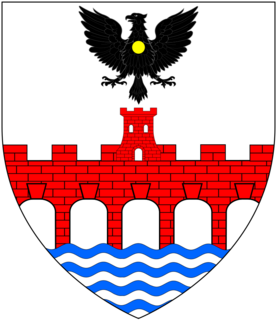
The Lethbridge Baronetcy, of Westaway House in Devon and Winkley Court in the County of Somerset, is a title in the Baronetage of the United Kingdom. It was created on 15 June 1804 for John Lethbridge, who was later Member of Parliament (MP) for Minehead in Somerset, from 1806 to 1807. The second Baronet sat as MP for Somerset between 1806 and 1812 and 1826 and 1830.
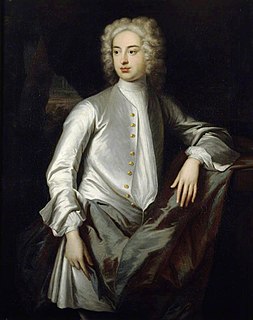
Sir Hugh Acland, 6th Baronet of Killerton Devon was a British landowner and politician who sat in the House of Commons from 1721 to 1727.

Sir Thomas Dyke Acland, 7th Baronet of Killerton in Devon and Petherton Park in Somerset, was Member of Parliament for Devon, 1746–1747, for Somerset, 1767–1768, and was High Sheriff of Somerset in 1751. He was a prominent member of the West Country gentry, and a famous staghunter who used as his hunting seats his wife's Exmoor estates of Pixton and Holnicote.
Sir Roger Mostyn, 3rd Baronet, of Mostyn Hall, Holywell, Flintshire, was a Welsh Tory politician who sat in the English and British House of Commons for 25 years from 1701 to 1735.
The Wroth Baronetcy, of Blenden Hall in the County of Kent, was a title in the Baronetage of England. It was created on 29 November 1660 for John Wroth. The baronetcy became extinct upon the death of the third Baronet in 1721. The third Baronet, whose seat was Petherton Park in Somerset, was Member of Parliament for Bridgwater, for Somerset and for Wells. The title became extinct on his death in 1721.
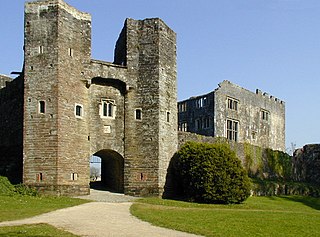
Sir Edward Seymour, 3rd Baronet of Berry Pomeroy Castle was an English politician who sat in the House of Commons at various times between 1640 and 1688. He fought for the Royalist cause in the English Civil War.
Sir Thomas Wroth was an English gentleman-poet and politician who sat in the House of Commons at various times between 1628 and 1660. Active in colonial enterprises in North America, he became a strong republican in the Rump Parliament but stopped short of regicide.
Thomas Palmer, FRS of Fairfield Stoke Coursey, was a British lawyer and Tory politician who sat in the House of Commons between 1715 and 1735.
Sir Thomas Culpeper, 3rd Baronet, also known as Colepeper, of Preston Hall, Aylesford, Kent was an English landowner and Whig politician who sat in the English and British House of Commons between 1705 and 1723.
Sir Jonathan Cope, 1st Baronet, was a British landowner and politician who sat in the House of Commons from 1713 to 1722.

John Rolle of Stevenstone and Bicton in Devon, was a British landowner and Tory politician who sat in the English House of Commons from 1703 to 1705 and in the British House of Commons from 1710-1730. He declined the offer of an earldom by Queen Anne, but 18 years after his death his eldest son was raised to the peerage in 1748 by King George II as Baron Rolle.

Tetton is an historic estate in the parish of Kingston St Mary in the English county of Somerset. The present grade II* listed Tetton House dates from 1790 and was enlarged and mainly rebuilt in 1924-6 by Hon. Mervyn Herbert (1882-1929) to the design of the architect Harry Stuart Goodhart-Rendel.

The Manor of Poltimore is a former manor in Devon, England. The manor house known as Poltimore House survives in its 18th-century remodelled form, but has been dilapidated for several decades. A charity named the "Poltimore House Trust" has been established for the purpose of its restoration. The manor was situated within the historic Wonford Hundred and was largely coterminous with the parish of Poltimore and contained the village of Poltimore, 4 miles (6.4 km) north-east of the historic centre of the City of Exeter. It should not be confused with the eponymous Devon estate of Poltimore in the parish of Farway, 16 miles (26 km) east of Exeter. Poltimore was the principal seat of the Bampfylde family from c. 1300 to 1920.
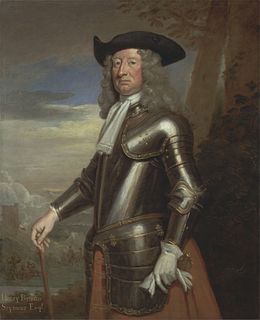
Henry Seymour later Portman, of Orchard Portman, Somerset, was an English politician who sat in the House of Commons of England and then Great Britain almost continually between 1679 and 1715.
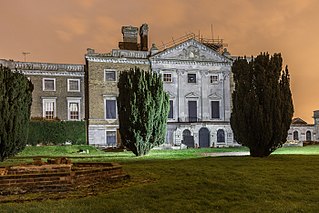
Sir Thomas Webster, 1st Baronet, of Copped Hall, Essex, and Battle Abbey, Sussex, was a British landowner and Whig politician who sat in the English and British House of Commons between 1705 and 1727.
The descent of the Holnicote estate in Somerset, England, is as follows:

Sir Richard Mill, 5th Baronet of Woolbeding House, Sussex was a British landowner and politician who sat in the House of Commons between 1721 and 1747.

Sir Thomas Mackworth, 4th Baronet of Normanton Hall, Rutland, was a British landowner and politician who sat in the English House of Commons between 1694 and 1708 and in the British House of Commons between 1713 and 1727. He was a speculator in mining.
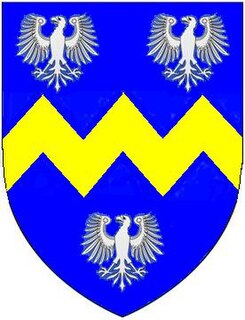
Sir John Walter, 3rd Baronet of Sarsden House, Oxfordshire was a British politician who sat in the English House of Commons between 1694 and 1717 and in the British House of Commons from 1708 to 1722.
References
- ↑ "WROTH, Sir Thomas, 3rd Bt. (c.1674-1721), of Petherton Park, Som". History of Parliament Trust. Retrieved 23 February 2019.